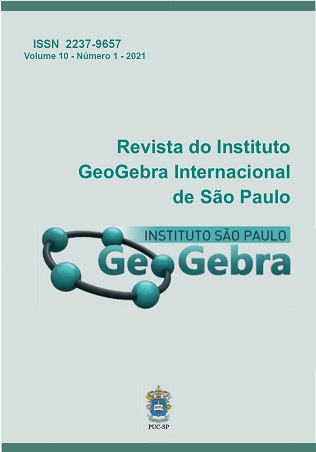Using GeoGebra in generalization processes of geometrical challenging problems
DOI:
https://doi.org/10.23925/2237-9657.2021.v10i1p049-064Keywords:
Geometrical theorems, Mathematics Teaching, Geometry softwareAbstract
We generalize in this work three geometrical challenging problems addressed in mathematics literature. In generalizations, we adopt the theoretical assumptions established for this process and use GeoGebra to build figures and animation. The proposed and solved generalizations establish natural links between some mathematics areas, highlighting the importance of generalization processes for constructing mathematical knowledge in undergraduate programs in mathematics teacher education. We conclude that the use of GeoGebra was essential to a comprehensive understanding of the structures for generalization.
References
ALLEN, F. B. Teaching for generalization in geometry. The Mathematics Teacher, 43(6), 245-251, 1950.
DAVYDOV, V. V. Type of generalization in instruction: Logical and psychological problems in the structuring of school curricula. Reston Virginia, National Council of Teachers of Mathematics, 1990.
DUMITRASCU, G. Understanding the process of generalization in mathematics through activity theory. International Journal of Learning, Teaching and Educational Research, 16(12), 46-69, 2017. Available at:https://doi.org/10.26803/ijlter.16.12.4.
GEOGEBRA. Download GeoGebra apps. 2021. Available at: https://www.geogebra.org/download.
GKIOULEKAS, E. On the denesting of nested square roots. International Journal of Mathematical Education in Science and Technology, 48(6), 942-953, 2017. Available at: https://doi.org/10.1080/0020739X.2017.1290831.
HASHEMI, N.; ABU, M. S.; KASHEFI, H.; RAHIMI, K. Generalization in the learning of mathematics. 2nd International Seminar on Quality and Affordable Education (ISQAE), 208-215, 2013.
HILL, T. Essential trigonometry: A self-teaching guide. 2nd ed. Pacific Grove CA, Questing Vole Press, 2019.
LAGO, R. C.; NÓS, R. L. Investigando teoremas de geometria plana com o GeoGebra. Revista do Instituto GeoGebra de São Paulo, 9(3), 15-29, 2020. Available at: https://doi.org/10.23925/2020.v9i3p015-029.
LOOMIS, E. S. The Pythagorean proposition. Washington DC, National Council of Teachers of Mathematics, 1968.
MASON, J. Expressing generality and roots of algebra. Approaches to algebra: Perspectives for research and teaching, 65-86, 1996.
NELSEN, R. B. Proofs without words: exercises in visual thinking. Washington DC, The Mathematical Association of America, 1993.
NÓS, R. L.; SAITO, O. H.; OLIVEIRA, C. A. M. de. Um caso particular do problema de Apolonio, os teoremas de Stewart e de Heron e a demonstração nas aulas de matemática. C.Q.D. – Revista Eletrônica Paulista de Matemática, 6, 48-59, 2016. Available at: https://doi.org/10.21167/cqdvol6201623169664rlnohscamo4859.
NÓS, R. L.; SAITO, O. H.; SANTOS, M. A. dos. Geometria, radicais duplos e a raiz quadrada de números complexos. C.Q.D. – Revista Eletrônica Paulista de Matemática, 11, 48-64, 2017. Available at: https://doi.org/10.21167/cqdvol11201723169664rlnohsmas4864.
NÓS, R. L.; FERNANDES, F. M. Equicomposição de polígonos e o cálculo de áreas. Proceeding Series of the Brazilian Society of Computational and Applied Mathematics, 6(2), 010272-1 – 010272-7, 2018. Available at: https://doi.org/10.5540/03.2018.006.02.0272.
NÓS, R. L.; FERNANDES, F. M. Ensinando áreas e volumes por equicomposição. Educação Matemática em Revista, 24(63), 121-137, 2019.
PARK, J.; KIM, D. How can students generalize examples? Focusing on the generalizing geometric properties. EURASIA Journal of Mathematics Science and Technology Education, 13(7), 3771-3800, 2017. Available at:https://doi.org/10.12973/eurasia.2017.00758a.
POSAMENTIER, A. S.; SALKIND, C. T. Challenging problems in geometry. New York, Dover, 1996.
SINGH, S. Fermat’s last theorem. London, Fourth Estate, 2002.
SRIRAMAN, B. Reflective abstraction, uniframes and the formulation of generalizations. The Journal of Mathematical Behavior, 23, 205-222, 2004.
VYGOTSKY, L. S. Thought and language. Cambridge MA, MIT Press, 1986.
WEISSTEIN, E. W. Power sum. 2020. Available at: https://mathworld.wolfram.com/PowerSum.html.
Downloads
Published
How to Cite
Issue
Section
License
Submission, processing, and publication of articles sent to the journal and registration of the DOI at Crossref is free of charge.
Authors retain their copyright and grant the journal the right of first publication of their article, which is simultaneously licensed under a Creative Commons - Attribution 4.0 International license CC BY that allows others to share the article by acknowledging its authorship and initial publication by the journal.
The GeoGebra journal encourages its authors to register their work with information and communication management systems aimed at researchers, such as Academia.edu, Mendeley, ResearchGate, etc.


 10.23925
10.23925
